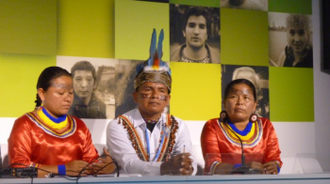Paris Blog 5: "Proud to be here and to be heard"

Amazonia Kichwa people
A great cheer went up today when an indigenous Kichwa woman from Ecuador started her talk by saying: "I am proud to be here and to be heard". She was speaking at one of many meetings held today at the 'Climate Generations Area', which is open to the general public for the duration of COP21, right next door to the main conference. I spent the day there with my Columban and J&P colleagues and what an experience it was!
At this meeting three Amazonia Kichwa people in tribal dress told their story, of how their struggle began 25 years ago when oil companies moved onto their land around the community of Sarayaku. "We suddenly found we had to defend our living forest of trees, lagoons, lakes, mountains and fellow creatures" they said, and they took their struggle - often with babies in arms - to courts in Quito and Costa Rica.
"We feel we've been fighting this battle for the entire world" they continued, "because the Amazon is valuable for all humanity". Their call to COP21 is to value "spaces of life", and, particularly in the face of climate change, the living systems of rainforests. They want their region and others like it to be declared zones that are free of oil, mineral and lumber extraction. The packed room listened intently and the presence of many cameras and TV crews suggested there was considerable interest in their proposal.
Then on to a large auditorium to hear health experts from around the world speak to the theme, 'How climate change will change your health'. The panel was as high-powered as it could be to urge that climate change needs to be factored into health planning in the future and the training of health professionals. One expert had crossed the Arctic in a balloon taking measurements of air quality and found very significant pollutants 300 metres up. And their impact is exacerbated with a warming planet; the mix of pollution and heatwaves, for example, can be deadly to people with respiratory and cardio-vascular vulnerabilities. One expert spoke about doctors in Northern Europe needing to recognise the signs of Lyme disease, and further south to recognise dengue fever and malaria, which are creeping northwards. In Africa, Latin America and Asia there is a correlation, apparently, between the flooding of severe weather, water stagnation, and the increase in mosquitoes and parasites. Case studies were given from Guyana and Burundi. "It is not just polar bears affected by climate change", one panelist said, "it is us".
Well after that I chose to go into a positive session about green cities of the future and the city chosen for attention happened to be Bristol, where two of my sons have been at university. How interesting to hear, amidst the focus on Bristol, a city planner from South Africa discuss a low carbon strategy in his context where people are desperate to have access to electicity, with advice thrown in by a woman from Ontario, Canada, where wind turbines have been placed at the centre of the city to get people used to accepting them. The Bristol panel gave much food for thought - from developing renewables in a way that increases local employment, to strategies for reducing energy demand in the future. "What contact have you had with Bristol's network of churches and faith groups?" I asked; "None at all" was the immediate response. O dear! Surely church efforts of livesimply initiatives and eco-congregations should be linking in with the commendable efforts of city planners in Bristol and elsewhere.
Then there were the stalls to visit.... solar energy initiatives in Japan, 'Bees for Development', international educational initiatives about the role of oceans in generating climate; and the audio visuals to view..... what a 2 degrees and 4 degrees global rise in temperature would mean for cities such as Tokyo, Washington DC, Dubai and London - massive flooding judging by these virtual presentations! (Actually, I'd like to see similar predictions regarding nuclear power stations situated on coasts.)
There were many enjoyable and creative initiatives. When the French Minister for Ecology and Head of the French delegation to COP21, Ségolène Royal, popped in from the negotiating zone to visit a stand on France's agriculture and fisheries she had a taste from a lavish presentation of oysters, wine, French cheese and bread. As soon as she left we were all invited to partake and we just dived right in. There was an international celebration right there which everyone enjoyed. Columban JPIC put messages on a 'tree of hope', as clapping and cheering could be heard from a large gathering of youth brought together by UNESCO to discuss their role in building a sustainable future.
It isn't just the country negotiaters at this UN conference, but civil society throughout the world that is trying to combat climate change and both are represented here in Paris at COP21. It is easy to be frustrated that action so far has been too slow and too weak to meet the scale of the problem, and that greater priority seems to be given to beating the drums of war back home. Yet, I took inspiration that so much is being attempted, and that the voices of marginalised people bearing the brunt of environmental crises for decades have been given a global platform, and are being heard.


















